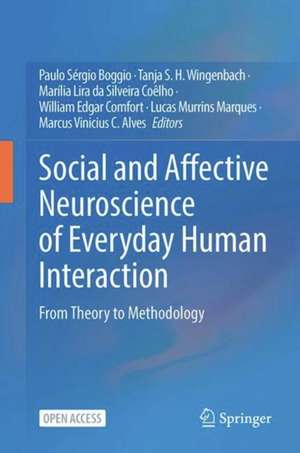Social and Affective Neuroscience of Everyday Human Interaction: From Theory to Methodology
Editat de Paulo Sérgio Boggio, Tanja S. H. Wingenbach, Marília Lira da Silveira Coêlho, William Edgar Comfort, Lucas Murrins Marques, Marcus Vinicius C. Alvesen Limba Engleză Paperback – 30 noi 2022
| Toate formatele și edițiile | Preț | Express |
|---|---|---|
| Paperback (1) | 282.19 lei 22-36 zile | +25.97 lei 5-11 zile |
| Springer International Publishing – 30 noi 2022 | 282.19 lei 22-36 zile | +25.97 lei 5-11 zile |
| Hardback (1) | 431.18 lei 43-57 zile | |
| Springer International Publishing – 30 noi 2022 | 431.18 lei 43-57 zile |
Preț: 282.19 lei
Nou
Puncte Express: 423
Preț estimativ în valută:
54.01€ • 58.69$ • 45.40£
54.01€ • 58.69$ • 45.40£
Carte disponibilă
Livrare economică 31 martie-14 aprilie
Livrare express 14-20 martie pentru 35.96 lei
Preluare comenzi: 021 569.72.76
Specificații
ISBN-13: 9783031086533
ISBN-10: 3031086538
Pagini: 302
Ilustrații: XXXIII, 302 p. 55 illus., 48 illus. in color.
Dimensiuni: 155 x 235 x 29 mm
Greutate: 0.47 kg
Ediția:1st ed. 2023
Editura: Springer International Publishing
Colecția Springer
Locul publicării:Cham, Switzerland
ISBN-10: 3031086538
Pagini: 302
Ilustrații: XXXIII, 302 p. 55 illus., 48 illus. in color.
Dimensiuni: 155 x 235 x 29 mm
Greutate: 0.47 kg
Ediția:1st ed. 2023
Editura: Springer International Publishing
Colecția Springer
Locul publicării:Cham, Switzerland
Cuprins
Molecular imaging of the human emotion circuit.- The neurocognitive mechanisms of unconscious emotional responses.- Social and Affective Neuroscience of Embodiment.- The neuroscience of beauty.- Mirror Neurons … in action: ERPs and neuroimaging evidence.- Sex differences in social cognition.- Development of morality and emotional processing.- Trust in Social Interaction: From Dyads to Civilizations.- The time has come to be mindwanderful: Mind wandering and the intuitive psychology mode.- Social Cognition development and socio affective dysfunction in childhood and adolescence.- Clinical neuroscience meets second-person neuropsychiatry.- EEG and ERPs in the study of Language and Social Knowledge.- fMRI and fNIRS methods for social brain studies: hyperscanning possibilities.- Modulating the Social and Affective Brain with transcranial stimulation techniques.- What our eyes can tell us about our social and affective brain?.- Facial EMG – Investigating the interplay of facial muscles and emotions.
Notă biografică
Paulo Sergio Boggio holds a Bachelor's degree in Psychology, MSc and PhD from the University of São Paulo. He leads the Social and Cognitive Neuroscience Laboratory at the Center for Health and Biological Sciences, Mackenzie Presbyterian University. He is a Professor in Developmental Disorders and Psychology at Mackenzie Presbyterian University. He is a CNPq researcher Fellow and a Fellow of the Association for Psychological Science. In 2011, he was elected an Affiliate Member of the Brazilian Academy of Sciences. He has wide experience in the field of Psychology, with an emphasis on Social and Affective Neuroscience. He also has experience with the use of non-invasive techniques of brain stimulation, high density EEG, eye-tracking, and other techniques.
Marcus Vinicius Alves has a PhD from Universidade Federal de São Paulo, and experience as a Visiting Researcher at Memorial University of Newfoundland (St. John’s, Canada) and as a Research and Development Specialist at Université du Luxembourg (Esch-sur-Alzette, Luxembourg). Currently, Marcus Vinicius Alves is a professor at the Faculty of Health Sciences, Universidade Federal do Rio Grande do Norte, Santa Cruz, Brazil. Alves’ research interests include learning, mental effort (attention control and cognitive load), incidental and motivated forgetting, and social cognition, mainly utilizing behavioral experiments, fNIRS, eye tracking, and pupillometry.
Textul de pe ultima copertă
This Open Access book presents the current state of the art knowledge on social and affective neuroscience based on empirical findings. This volume is divided into several sections first guiding the reader through important theoretical topics within affective neuroscience, social neuroscience and moral emotions, and clinical neuroscience. Each chapter addresses everyday social interactions and various aspects of social interactions from a different angle taking the reader on a diverse journey. The last section of the book is of methodological nature. Basic information is presented for the reader to learn about common methodologies used in neuroscience alongside advanced input to deepen the understanding and usability of these methods in social and affective neuroscience for more experienced readers.
Caracteristici
This book is open access, which means that you have free and unlimited access Presents integrative view of neuroscience that is social, affective, moral, political, and interpersonal Provides a holistic view of social behavior, from the molecular level to daily human interactions Serves as an introduction to advanced topics for students, and as guide for more advanced research
